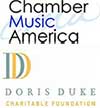Wayne Horvitz returns to The Shedd with the combined forces of his working ensembles The Gravitas Quartet and Sweeter Than The Day on the world premier tour of "Some Places Are Forever Afternoon", his extraordinary new suite of 11 pieces based on the poems of Northwest poet Richard Hugo (1923-82). Each composition is inspired by a different Hugo poem. The pieces include composed and improvisational elements.
The performance of each will be followed by a reading of its corresponding poem by poet and Richard Hugo scholar Frances McCue.
The members of the ensemble are: Wayne Horvitz-piano, Ron Miles-trumpet, Peggy Lee-cello, Sara Schoenbeck-bassoon, Timothy Young-guitar, Keith Lowe-bass and Eric Eagle-drums.
"Some Places Are Forever Afternoon" was created with funding from the Shifting Foundation. The performance(s) of Wayne Horvitz: Some Places Are Forever Afternoon, presented in collaboration with Earshot Jazz and Helena Presents/Myrna Loy Center, is supported by Presenter Consortium for Jazz, a program of Chamber Music America funded through the generosity of the Doris Duke Charitable Foundation.

This concert is eligible for The Shedd's
Free Shedd Jazz Student Ticket program, which makes a limited number of free tickets to 2015-16 Shedd jazz concerts available to students elementary through college. The program is made possible by a grant from
Chamber Music America and
Doris Duke Charitable Foundation. Contact The Shedd Ticket Office for information.

Richard Hugo was born in White Center, and lived throughout the Northwest before settling in Missoula, Montana. He taught poetry at the University of Montana, and is the inspiration for a plethora of writers of the west, including James and Lois Welch, William Kittredge, Frances McCue and countless others. The Richard Hugo House in Seattle is named in his memory. Hugo passed away in 1982.
Hugo loved to visit the small towns and odd places all through this part of the world, from West Marginal Way to La Push to the Union Bar Grill in rural Montana. He would sit in a café or bar for hours before he returned home to write. He was a great lover of music, and jazz in particular. It is Hugo's enduring love of music, rambling, and the places of the Northwest that inspired Horvitz's interpretation of his work, which honors and celebrates the poet's legacy.